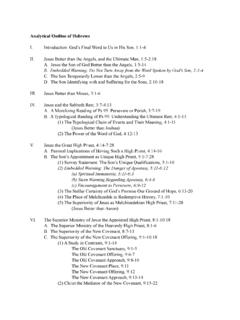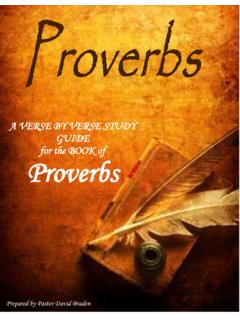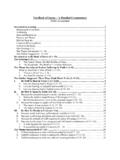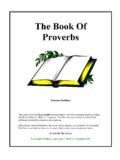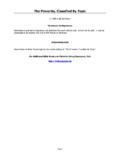Transcription of DE 506 | THE BOOK OF PROVERBS
1 DE 5060 | THE book OF PROVERBS 3 sem. hrs. I. Course Description An exegetical study of The book of PROVERBS in both its cultural and historical setting and in its literary setting with attention to its critical and hermeneutical problems. II. Course Objectives A. General Objectives: 1. To understand the book of PROVERBS in its historical, canonical, and contemporary contexts. 2. To know God by doing His will as expressed in this book . B. Specific Objectives: 1. To understand the forms of sapiential literature in the book of PROVERBS as understood in part from Ancient Near Eastern collections of sayings and admonitions 2. To understand its court setting and its democratization 3. To define "wisdom" precisely and to understand the relationship of God and man to wisdom 4. To understand the relationship of the book of PROVERBS with other forms of wisdom in the Bible 5. To understand the hermeneutical issues in using the book : , the fittingness of a proverb to a given situation; the truthfulness of its promise of prosperity and life; the distinction between that which is abiding from that which is historically and culturally conditioned.
2 6. To understand the book 's teaching on selected topics III. Course Materials A. Waltke, Bruce K. The book of PROVERBS , Audio Lecture Series, Study Guide, and Expanded Study Guide. Grand Rapids, MI: Institute of Theological Studies, a division of Outreach, Inc., 1988. (Purchase from ) B. Textbooks Crenshaw, James L. Old Testament Wisdom: An Introduction, rev. ed. Louisville: Westminster John Knox Press, 1998 (Note that this syllabus has been paginated according to the revised edition). (ISBN-10: 0664234593; ISBN-13: 978-0664234591) Kidner, Derek. PROVERBS : An Introduction and Commentary. Tyndale Old Testament Commentary, Vol. 15. Downers Grove, IL.: InterVarsity Press, 1964. (ISBN-10: 0830842179; ISBN-13: 978-0830842179) _____. The Wisdom of PROVERBS , Job and Ecclesiastes: An Introduction to Wisdom Literature. Downers Grove, IL.: InterVarsity Press, 1985. (ISBN-10: 0877844054; ISBN-13: 978-0877844051) Von Rad, Gerhard. Wisdom in Israel.
3 Nashville: Abingdon Press, 1972. Reprint, Valley Forge, PA: Trinity Press International, 1993. (ISBN-10: 0334017947; ISBN-13: 978-0334017943) C. DE 506 Coursepack (the following materials comprise a coursepack that can be found in your documents folder in your course forum): Bryce, A Legacy of Wisdom: The Egyptian Contribution to the Wisdom of Israel. London: Associated United Press, 1979, pp. 80-87. Clements, Ronald E. One Hundred Years of Old Testament Interpretation. Philadelphia: Westminster Press, 1976, pp. 99-117. Malchow, Bruce V. "A Manual for Future Monarchs," Catholic Biblical Quarterly 57 (1955): 238-245. Pritchard, James B., ed. The Teaching of Amenemope in Ancient Near Eastern Texts: Relating to the Old Testament. Princeton Univ. Press, 1969. pp. 421-425. Ruffle, John. "The Teaching of Amenemope and its Connection with the book of PROVERBS ," Tyndale Bulletin 28 (1977) :29-68. Waltke, Bruce K. "The book of PROVERBS and Ancient Wisdom Literature," Bibliotheca Sacra 136 (1979) :221-238.
4 IV. Course Requirements A. The daily or individual lecture assignments (see documents folder in course forum) can be turned in as they are completed. This will be worth 40% of the grade. B. There will be one closed- book final examination worth 45% of the course. C. The student will be expected to read at least 1200 pages from the assigned required and suggested readings, submitting a list detailing authors, books, and pages read. Also, every chapter of the book of PROVERBS should be read at least three times, preferably once in the King James Version, and once in each of the New International Version and the New American Standard Version. This will be worth 10% of the grade. D. The student is required to participate in the discussion areas of TriNet. Thoughtful responses should be given to at least one question in each discussion area, and responses to the comments of other students are encouraged. This will be worth 5% of the grade. All assignments should be submitted directly to your Course Tutor using the icon within your TriNet course (labeled with your tutors name).
5 Exams should be mailed by your proctor to the address below. Course work may be submitted by mail if necessary. Distance Education Trinity Evangelical Divinity School 2065 Half Day Road Deerfield, IL 60015 If you have questions related to your assignments, please contact your Course Tutor in TriNet. All other questions should be directed to the Distance Education office (email or 847-317-6554). STUDY GUIDE FOR THE FINAL EXAM 1. Be able to deal with the various issues raised in the lectures. These include: theodicy, relation of PROVERBS and Amenemope, and the means of hokmah ( wisdom ), slysym ( 30"), aharit ( end ), and issa zara. 2. Be able to utilize Alter s categories from memory (both symbols and classification explanations). 3. Be able to discuss various approaches to the classification of the PROVERBS . This should include the ability to interact critically with the various approaches. 4. Be familiar with the major contributions to the study of wisdom literature and their applications to the study of the book of PROVERBS .
6 5. Be able to answer the question, What is the authority of wisdom? 6. The promises of the PROVERBS can be problematic when compared to experience. Be familiar with the reasoning by which the two are reconciled. 1988 by OUTREACH, INC., 3140 Three Mile Road , Grand Rapids, Michigan 49505. Modifications 2007 by TEDS Distance Education All Rights Reserved. This Programmed Syllabus forms part of the Recorded Lecture Series on The book of PROVERBS by Dr. Bruce K. Waltke in the Institute of Theological Studies, a division of OUTREACH, INC. No part of this Programmed Syllabus can be reproduced in any form whatsoever without written permission of OUTREACH, INC.
